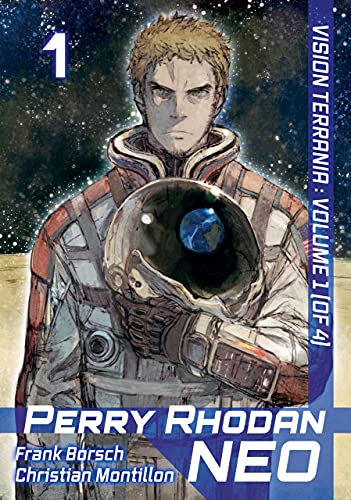“My name is Crest da Zolral.” The alien was waiting for them by the inner hatch of the airlock. “I am an Arkonide. In your terms, I’d describe myself as the scientific leader of this expedition.”
 As tensions rise in 2036 between America, Greater Russia, and China, an American moon base goes dark. NASA attempts a rescue mission by sending the Stardust, commanded by Perry Rhodan. But when Rhodan and his crew find a giant metal sphere on the far side of the moon, their problems–and those of the entire human race–grow far more complex. And getting back home is no certainty as there is a bomb hidden on the Stardust.
As tensions rise in 2036 between America, Greater Russia, and China, an American moon base goes dark. NASA attempts a rescue mission by sending the Stardust, commanded by Perry Rhodan. But when Rhodan and his crew find a giant metal sphere on the far side of the moon, their problems–and those of the entire human race–grow far more complex. And getting back home is no certainty as there is a bomb hidden on the Stardust.
Meanwhile, in Houston, John Marshall valiantly attempts to keep his children’s shelter running–and the street children away from each other’s throats. Marshall has always had an intuitive knack for reading people, but nothing prepared him for when one of his problem children suddenly teleports the two of them to Nevada Fields so that they can see the Stardust’s launch.
Thus begins Stardust, the first episode of Perry Rhodan NEO, a retelling of the world’s most popular science fiction series. Introduced to the world at WeltCon 2011, NEO updates the geopolitics and technologies from the Cold War and punchcards to a 2010 multipolar world, transistors, and information technology. Perry Rhodan NEO is published concurrently with the original Perry Rhodan series and is written by some of the same authors. Frank Borsch, the author of the first book in the Perry Rhodan: Lemuria series, revisits Rhodan’s first adventure in Stardust.
Rhodan is a veteran American astronaut of German descent who has won fame when his quick reactions saved a lunar shuttle from crashing. Who else should NASA send on a high-profile rescue mission? Rhodan is a mix between an old naval captain and a test pilot from The Right Stuff, although without all the Yeager-isms expected of such. He has an easy camraderie with his crew akin to that of a Doc Savage or a Buck Danny, and serves as the compentent leader of an equally gifted crew. As such, Rhodan’s an idealized pulp hero on a collision course with proud aliens and sinister governments–including his own.
The impending First Contact avoids the colonial mishaps that serve as the model for most science fiction. Technological sophistication is not confused for moral superiority While the American Stardust is more primitive than the Arkonides’ ship, Rhodan’s quick wits and keen insights keep him on equal footing with the humanoid Arkonides. These space invaders are a decadent people, wrapped up in the obsessions of their game worlds. Despite their mechanical sophistication, Rhodan has one bargaining chip: human medical technology that can treat the cancer wracking the body of their leader, Crest da Zolral. With that alliance secured, Rhodan must return home to a world filled with nations eager to deprive their enemies of whatever bounties Rhodan may have secured.
The second episode, Utopia Terrania, finds Rhodan and his crew in the Gobi Desert surrounded by the Chinese Army. Meanwhile, the world deals with the whispers and realizations of alien contact. While Rhodan verbally fences with the Chinese commander, the disgraced agents who told him about the bomb on Stardust are trying to reach him with information urgent to his survival. If Stardust was part pulp opera and part The Cross and the Switchblade, Utopia Terrania is more convential–and cynical–science fiction with a sprinkling of X-Files’ paranoia and the author’s own…fascinations. Hopefully, the third episode will bring the action back out of the bedroom into the boardroom—and the focus back to Rhodan.
Compared to The Ark of Stars, the translation is cleaner, without some of the awkwardness that plagued the 2004 Perry Rhodan release. Some of the sentance complexity has been swapped out for clarity, but those seeking a more robust prose than Perry Rhodan NEO’s publisher’s Japanese light novels will not be disappointed.
While reimaginings have recently soured the idea of a reboot, a technical refresh of Perryvese technology is welcome, especially since 50 years has wrought modern marvels unexpected when the first series has written. However, the geopolitical update is already quaint. We may yet be heading into a multi-polar world with uneasy relations between America, Russia, and China, but ten years of popularism, nationalism, and mass imigration have eroded 2010’s cosmopolitan globalism and trust in the soft power of influence. So the utopianist assumptions of how the Perry Rhodan NEO world works ring more hollow than punchcard spaceships. Mix in Elon Musk and the commercial space revolution, and NEO is just as dated as the original series. Contemporary events, after all, move faster than those of fiction.
That said, Perry Rhodan NEO offers an alternative to space operas cluttered by Star Wars, Horatio Hornblower, and Starship Trooper tropes. And it allows readers an easy entry point into the vast and nearly 3000 volume Perryverse, the world’s most popular science fiction series. Again, if PErry Rhodan NEO is successful, it may open the door to the main Perryverse returning to English audiences as well as the introduction of more European pulp series.
Great to see Perry Rhodan available for American audiences again.
-
agreed – just wish there were print copies